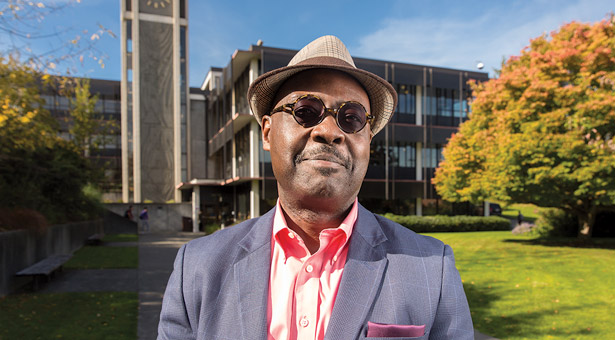The Bible & Theology Toward Christian Maturity
Yale Professor Challenges Church on Beauty
Theology for the Body
By Ruth Moon | Photo by Daniel Sheehan
 Willie Jennings, associate professor of systematic theology and Africana studies, Yale University
Willie Jennings, associate professor of systematic theology and Africana studies, Yale University
Christians need a better theology of ugliness, theologian Willie Jennings told the Seattle Pacific University community at a conference on art, theology, and the body.
Jennings, associate professor of systematic theology and Africana studies at Yale University, joined a panel with SPU art professor Laura Lasworth and Seattle School of Theology and Psychology theology professor Chelle Stearns to discuss the topic in a packed Demaray Hall classroom in late October.
In the evening, Jennings delivered a lecture at the University of Washington’s campus on “embodying the artistic spirit and the prophetic arts.”
The conference theme was chosen to encompass issues of racism, sexism, patriarchy, economic exploitation, and misogyny — all “manifestations of people’s beliefs about themselves and the world,” says Associate Professor of Theology Brian Bantum, who helped organize the conference in conjunction with the journal Literature and Theology.
“Theology is not about ideas or philosophical ideas about who God is,” Bantum says. “It arises from our experience of the world. We can only speak of God from the limitations of our bodies and the experiences of those who have come before us.”
During the panel, Stearns discussed her study of Austrian composer Arnold Schoenberg, known for his innovative, atonal music. Lasworth shared artwork she had created and a story of the ways childhood discord shaped her artistic interests.
Jennings said that one place a better theology of ugliness would serve the church is in discussions of race. Because physical beauty in the West is often defined by white standards, many people of color find themselves constantly trying to prove that they are beautiful enough to belong.
And Christians tend to forget the importance of looking for the socially unacceptable or aesthetically undesirable, and instead focus on the “beautiful.”
“What is made ugly is often precisely the thing that God wants us to see as the site of beauty and the remaking of the world,” Jennings said. “A Christ-formed life is a life that opens people to the very thing they do not desire.”
